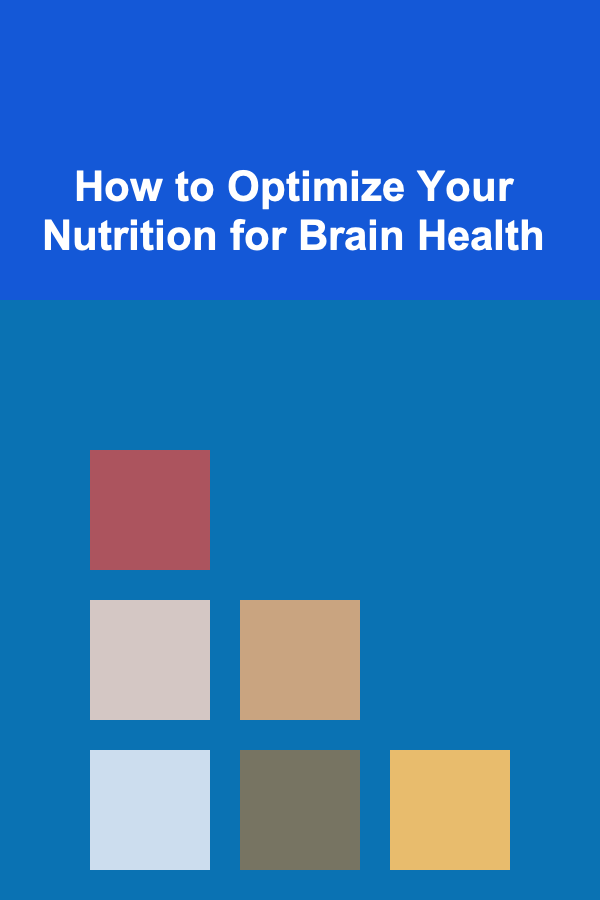
How to Optimize Your Nutrition for Brain Health
ebook include PDF & Audio bundle (Micro Guide)
$12.99$10.99
Limited Time Offer! Order within the next:

Our brains are the control centers of our entire bodies, overseeing everything from memory to decision-making, emotional regulation to physical coordination. Given how crucial brain function is to our daily lives, it's only natural that we should seek ways to enhance and optimize its health. One of the most effective ways to do this is by focusing on nutrition.
The relationship between food and brain health is not only a topic of growing interest in the scientific community but also a subject of increasing importance for anyone seeking to improve cognitive function, mental clarity, and emotional well-being. In this article, we will explore the science behind brain health, the nutrients necessary for cognitive performance, and practical steps you can take to optimize your nutrition for a healthy mind.
Understanding the Brain and Its Nutritional Needs
The brain is a highly complex organ that requires a variety of nutrients to function at its best. It is composed of over 100 billion neurons, each capable of forming thousands of connections with other neurons. These neurons rely on a steady supply of energy and nutrients to communicate effectively and maintain their structures.
Several factors influence brain function, including genetics, environment, lifestyle, and, of course, nutrition. Nutrients provide the fuel and building blocks needed to repair and maintain brain cells, support neurotransmitter production, and improve the brain's ability to function under stress.
The brain uses a significant portion of the body's total energy. In fact, it consumes about 20% of the total energy at rest. This energy primarily comes from glucose, but fatty acids and specific micronutrients also play important roles.
Key Nutrients for Brain Health
The following are some of the most important nutrients for maintaining and optimizing brain function:
A. Omega-3 Fatty Acids
Omega-3 fatty acids, particularly DHA (docosahexaenoic acid), are essential for maintaining brain structure and function. DHA makes up a large portion of the brain's gray matter, which is involved in cognitive function. These fats are critical for maintaining cell membrane integrity, which is vital for the transmission of electrical signals between neurons.
Research has shown that omega-3 fatty acids play a crucial role in reducing inflammation in the brain, improving memory, and supporting mood regulation. Omega-3s are commonly found in fatty fish like salmon, mackerel, and sardines, but can also be sourced from plant-based sources like flaxseeds, chia seeds, and walnuts.
B. Antioxidants
The brain is particularly vulnerable to oxidative stress due to its high metabolic activity. Free radicals---unstable molecules that can damage cells---are generated as a byproduct of this activity. Antioxidants help neutralize free radicals and protect the brain from oxidative damage.
Vitamins C and E are well-known antioxidants that help protect neurons from oxidative damage. Vitamin C also supports the production of neurotransmitters, which are necessary for communication between brain cells. These antioxidants can be found in citrus fruits, berries, leafy green vegetables, nuts, and seeds.
C. B-Vitamins
B-vitamins, especially B6, B9 (folate), and B12, are crucial for brain function. These vitamins are involved in the production of neurotransmitters like serotonin, dopamine, and norepinephrine, which regulate mood, stress response, and mental clarity. Folate and B12 are also essential for the formation of red blood cells and the maintenance of healthy brain tissue.
A deficiency in these vitamins has been linked to cognitive decline, mood disorders, and memory problems. B-vitamins can be found in a variety of foods, including whole grains, meat, poultry, fish, eggs, legumes, and leafy green vegetables.
D. Magnesium
Magnesium is a mineral that plays a critical role in brain function by supporting over 300 enzymatic reactions in the body, many of which involve brain function and energy production. Magnesium helps regulate neurotransmitter activity and is involved in the formation of new synapses---connections between neurons.
Research suggests that magnesium deficiency is associated with cognitive impairments, anxiety, and depression. Magnesium-rich foods include leafy greens, nuts, seeds, whole grains, and legumes.
E. Zinc
Zinc is another essential trace mineral that is involved in numerous processes in the brain. It supports synaptic plasticity (the ability of synapses to strengthen or weaken over time) and has been linked to improved learning and memory. Zinc also helps regulate neurotransmitter activity and protects against oxidative damage.
A deficiency in zinc has been associated with cognitive decline, mood disorders, and neurodegenerative diseases like Alzheimer's. Zinc can be found in foods like meat, shellfish, legumes, seeds, and nuts.
F. Vitamin D
Vitamin D is known for its role in bone health, but it also plays a significant role in brain health. Research suggests that vitamin D receptors are widespread in the brain, and a deficiency in vitamin D has been linked to cognitive decline, mood disorders, and even the development of conditions like schizophrenia and depression.
Vitamin D can be synthesized by the body through exposure to sunlight, but it can also be obtained from foods like fatty fish, fortified dairy products, and egg yolks.
The Gut-Brain Connection
In recent years, scientists have discovered a profound connection between the gut and the brain, known as the gut-brain axis. This connection emphasizes how the health of your gut microbiome---the community of bacteria, viruses, fungi, and other microorganisms in your digestive system---can significantly impact brain health.
A healthy gut microbiome supports the production of neurotransmitters and hormones involved in mood regulation and cognitive function. Studies have shown that a balanced diet, rich in fiber and prebiotics (food that nourishes good bacteria), can support the growth of beneficial gut bacteria and improve brain function.
Probiotics, found in fermented foods like yogurt, kefir, and kimchi, can also support gut health by promoting the growth of beneficial bacteria. Consuming a variety of plant-based foods, rich in antioxidants and fiber, further supports both gut and brain health.
The Role of Diet Patterns in Brain Health
While individual nutrients play a critical role in brain function, it's also important to consider the overall dietary pattern you follow. Studies have shown that certain eating patterns are particularly beneficial for maintaining cognitive function and preventing cognitive decline as we age.
The Mediterranean Diet
The Mediterranean diet, which emphasizes plant-based foods, healthy fats, whole grains, and lean protein sources, has been extensively studied for its positive effects on brain health. This diet is rich in antioxidants, omega-3 fatty acids, and monounsaturated fats, all of which support cognitive function.
Research has shown that individuals who follow the Mediterranean diet have a lower risk of developing Alzheimer's disease and other neurodegenerative conditions. The diet's emphasis on whole, minimally processed foods and anti-inflammatory components is believed to play a significant role in protecting the brain from age-related decline.
The DASH Diet
The DASH (Dietary Approaches to Stop Hypertension) diet is another eating pattern that has been linked to improved brain health. Originally designed to reduce high blood pressure, the DASH diet encourages the consumption of fruits, vegetables, whole grains, lean proteins, and low-fat dairy while limiting sodium, saturated fats, and added sugars.
This diet has been shown to lower the risk of stroke and dementia and may help improve cognitive function in older adults. Its focus on nutrient-rich foods that support brain function, such as leafy greens, berries, and nuts, makes it a great option for optimizing brain health.
How to Implement Brain-Boosting Nutrition
Now that we understand which nutrients are vital for brain health and the dietary patterns that support cognitive function, it's time to look at practical steps for implementing these principles into our daily lives.
A. Prioritize Whole, Nutrient-Dense Foods
Make it a habit to prioritize whole, minimally processed foods that are rich in the nutrients needed for optimal brain function. Focus on:
- Fruits and vegetables: Aim for a variety of colors and types to ensure a broad spectrum of antioxidants and vitamins. Berries, leafy greens, and cruciferous vegetables (like broccoli and kale) are particularly beneficial for brain health.
- Healthy fats: Incorporate sources of omega-3 fatty acids, such as fatty fish, chia seeds, and walnuts, into your meals. Also, include monounsaturated fats like olive oil and avocados.
- Whole grains: Choose whole grains over refined grains, such as quinoa, brown rice, and oats, to support stable blood sugar levels, which are essential for brain function.
- Lean protein: Include sources of lean protein like poultry, fish, beans, and legumes to support neurotransmitter production and cognitive function.
B. Limit Added Sugars and Processed Foods
Excessive consumption of sugar and processed foods has been linked to cognitive decline, inflammation, and mood disorders. Try to minimize your intake of sugary snacks, sodas, and highly processed foods, as they can negatively impact both brain and overall health.
C. Stay Hydrated
Hydration is essential for maintaining cognitive function. Even mild dehydration can impair memory, concentration, and mood. Aim to drink plenty of water throughout the day, and consider incorporating hydrating foods like cucumbers, watermelon, and oranges into your diet.
D. Mind Your Gut Health
As mentioned, gut health plays a critical role in brain function. Focus on including probiotic-rich foods, such as yogurt, kefir, and sauerkraut, in your diet. Also, consume plenty of fiber-rich foods like whole grains, legumes, and vegetables to support a healthy gut microbiome.
E. Supplement Wisely
While it's best to obtain nutrients from food, certain supplements may help fill in gaps in your diet, especially if you're at risk of deficiencies. Omega-3 supplements (in the form of fish oil or algae oil), B-vitamins, and vitamin D can be particularly helpful for brain health. However, always consult with a healthcare professional before starting any new supplement regimen.
Conclusion
Optimizing nutrition for brain health is not a one-size-fits-all approach, but by focusing on nutrient-dense, whole foods, you can provide your brain with the fuel it needs to perform at its best. Incorporating healthy fats, antioxidants, B-vitamins, and minerals like magnesium, zinc, and vitamin D into your diet can help support cognitive function, memory, and emotional well-being. Additionally, adopting healthy eating patterns like the Mediterranean and DASH diets can provide long-term benefits for brain health and protect against age-related cognitive decline.
By prioritizing your nutrition and adopting a holistic approach to brain health, you can enhance your cognitive abilities, improve mental clarity, and enjoy better overall well-being. The brain is one of the most powerful organs in the body---taking care of it through proper nutrition is one of the best investments you can make for both your present and future health.
Reading More From Our Other Websites
- [Home Pet Care 101] How to Make Homemade Cat Treats: Healthy and Delicious Recipes Your Feline Will Love
- [Home Party Planning 101] How to Organize a Home Cocktail Party
- [Personal Investment 101] How to Make Passive Income Through Deep Learning SaaS Solutions
- [Home Space Saving 101] How to Create a Spacious Feel in a Tiny Home
- [Organization Tip 101] Common Mistakes to Avoid When Installing Window Insulation Film
- [Personal Finance Management 101] How to Start Investing in Stocks: A Beginner's Guide
- [Personal Finance Management 101] How to Plan for Major Life Events (Weddings, Buying a Home, and More)
- [Organization Tip 101] How to Set Up an Effective Home Office Space
- [Home Security 101] How to Protect Your Home from Cyber Threats and Smart Device Hacks
- [Home Maintenance 101] How to Winterize Your Home for Energy Efficiency

Becoming a Successful Community Outreach Coordinator: Essential Skills for Engaging Communities
Read More
Building Better Browsers: Essential Skills for a Successful Web Developer Career
Read More
How to Understand the Origin of the Universe
Read More
How to Discuss Your Risk Tolerance with an Investment Advisor
Read More
How to Prepare a Living Will and Advance Healthcare Directives
Read More
10 Tips for Effective Communication with Other Healthcare Professionals
Read MoreOther Products

Becoming a Successful Community Outreach Coordinator: Essential Skills for Engaging Communities
Read More
Building Better Browsers: Essential Skills for a Successful Web Developer Career
Read More
How to Understand the Origin of the Universe
Read More
How to Discuss Your Risk Tolerance with an Investment Advisor
Read More
How to Prepare a Living Will and Advance Healthcare Directives
Read More